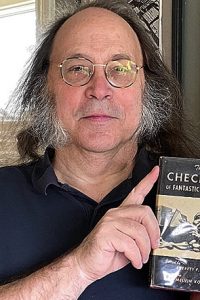Kameron Hurley: Story Isn’t Just “Stuff Happens”
 I brought my dogs to a new dog park this weekend, one frequented by experienced dog owners who enjoyed socializing their dogs. The park I usually go to is less frequented, with fewer dogs, and the owners are all worried and anxious sorts. Their dogs tend to be unsocialized, which contributes to their own fear about their dog’s potential behavior, and then their anxiety gets to the dogs, too, making the dogs fearful, and it’s one big go-around that makes everyone miserable.
I brought my dogs to a new dog park this weekend, one frequented by experienced dog owners who enjoyed socializing their dogs. The park I usually go to is less frequented, with fewer dogs, and the owners are all worried and anxious sorts. Their dogs tend to be unsocialized, which contributes to their own fear about their dog’s potential behavior, and then their anxiety gets to the dogs, too, making the dogs fearful, and it’s one big go-around that makes everyone miserable.
We all think we know how dogs work because many of us interacted with them as children, and we see them every day – in the park, in someone’s house, on television, in funny dog videos. But simple exposure doesn’t make us great dog people any more than reading a lot of books automatically makes us great writers.
At this new dog park, I was sharing the space with people who understood dogs. They knew when to let them work out their differences with each other, and when to break it up. The dogs could run around and after each other, sniffing each other and barking and romping, and nobody jerked at their leads or anxiously hovered over them. When I caught a group of dogs snarling and tussling, I went up to them and clapped my hands sharply to snap them out of it, and the pack ceased and moved on.
There is a freedom that comes from understanding dogs and letting them be dogs, but I had to learn how dogs were different from humans before I, too, was able to relax. Working with animals is like working with aliens. Even dogs, which have been bred to work companionably with humans, have alien ways of interacting with each other and the world, because their sense of the world is so very different from ours. Understanding that went a long way toward making me a better guardian to my dogs. Before I worked to figure out dog behavior, I’d spend a lot of time yelling at my dogs, futilely believing that leash tugging did anything at all, despite clear evidence to the contrary. I learned a lot of bad habits from friends and family who’d had dogs – disciplinary actions that, it turns out, not only don’t work, but actively harm the dog emotionally, and make them even more neurotic.
What fascinated me was how long I could get along in life not understanding the proper way to let a dog be a dog, when I had grown up with them, and when there were dogs all around me. It was the same process I went through when I realized that for my entire life, I was being taught how to write, but not how to tell stories. Here was this very human thing we all need to learn how to do, something every human intrinsically longs for and every human society does, and yet when it came time to learn how to put sentences down, I learned about grammar rules and how to make a singular perfect sentence… but not how to make that collection of sentences move people. I was being taught to get along with the words, and bend them to my will, in a way that simply wasn’t natural to the way that human beings use them.
Just because we have read stories doesn’t mean we intrinsically know how to write them, the same way that simply having a dog isn’t going to teach you how to better understand them.
Why do we teach people how to write instead of how to tell stories? Perhaps this is because we assume everyone knows how to tell a story. We relate anecdotes and gossip from a very young age. It’s part of being a social creature. But the act of storytelling at length is a skill that must be honed like any other, and it’s not a skill that we teach.
Storytelling is a powerful skill that can be leveraged in a variety of media, from books and comic books to videos and podcasts and narrative games of all sorts. One would think a potentially lucrative skill like storytelling would be an especially teachable thing today, but instead, I see novelists and filmmakers obsessed with issues of the medium instead of the message they want to deliver through that medium. It’s why so many novels ends up being just piles of pretty words stringing together events that don’t seem to build to anything, and so many films feature explosions and sex scenes that leave us feeling wowed by spectacle and then immediately empty, like eating junk food. There’s no emotional resonance. There’s nothing there. There’s no story.
My epiphany with story came during the realization that there are always two stories that make up a good piece of fiction. There is the external story, the thing we would call ‘‘plot.’’ These are the explosions and sex scenes and betrayals. Then there is the internal emotional story, the ‘‘so what?’’ Damon Knight was infamous for writing ‘‘so what?’’ at the end of student stories that didn’t move him. That’s because this internal emotional plot is the engine of all those external plot elements. It is this internal story, the character’s desires and eventual emotional realization or reversal, which must drive that external story. If you have a series of events strung together that don’t move your protagonist, they are not likely to move your reader.
I expect that this lazy way of creating media persists because it’s still very possible to make money writing pure spectacle – there will always be a brisk market for porn and explosions. But the truly enduring stories, the narratives we encourage our friends to pick up and which happily make money for their creators over decades, the stories that outlast their creators, are the ones that reveal some core human truth.
While it may appear that we seek stories as a means of escape, nothing could be further from the truth. We seek out stories because they help us make sense of the world and societies we live in today, which is the real reason we grasp for them most during dark times. We seek out stories to learn how to be better humans, to learn how to cope with loss and heartache and fear and war and peace and utter despair, as well as stories about joy, found families, reconciling with loved ones, and finding an emotional connection with others. Stories that fail to explore these basic emotional challenges are stories that will soon lose our interest.
In truth, it is far easier and less harrowing to teach young people the rules of grammar than those of human emotion, because the human heart is complex and messy and sometimes dirty and awful and silly. We are, often, aliens even to one another. It is our shared stories that can bring us together.
This disassociation from human emotion also dooms many would-be science fiction writers in particular, who spend so much time creating a technological widget that they forget that the reason we’re reading science fiction isn’t for the widget – it’s to find out how the widget affects the way we live and love. We want to know how it will change us or help us explore what it is to be human.
As we go about plotting our futures, let’s remember that readers are far more interested in exploring what it means to be human than how grammatically correct our sentences are. Pretty writing does not equal explosive story. Pretty writing without story might look nice, but it is like trying to engage a dog by yanking at its leash. You may have its attention for a short moment, but if you want its full attention, you’d be better served by offering up a piece of cheese that speaks to its powerful sense of smell and voracious appetites.
Humans are emotional creatures. We crave emotional stories. Carving that out and away tries to turn us into something we are not. Tell me what it means to be human. Awaken my fears, my hopes, my desires, and show me how to get through the very best and worst that life has to offer. I’ll thank you for it with my pocketbook, and I’ll tell my friends.
Kameron Hurley is the author of The Stars are Legion and the award-winning essay collection The Geek Feminist Revolution, as well as the God’s War Trilogy and The Worldbreaker Saga. Hurley has won the Hugo Award, Kitschy Award, Locus Award, BFA Award, and Sydney J. Bounds Award for Best Newcomer. She was also a finalist for the Arthur C. Clarke Award, the Nebula Award, and the Gemmell Morningstar Award. Her short fiction has appeared in Popular Science Magazine, Lightspeed Magazine, and many anthologies. Hurley has also written for The Atlantic, Bitch Magazine, The Village Voice, and Entertainment Weekly. She posts regularly at KameronHurley.com.
This review and more like it in the June 2017 issue of Locus.






good advice, well done — from a dog guy,
greg
“While it may appear that we seek stories as a means of escape, nothing could be further from the truth. We seek out stories because they help us make sense of the world and societies we live in today, which is the real reason we grasp for them most during dark times. We seek out stories to learn how to be better humans, to learn how to cope with loss and heartache and fear and war and peace and utter despair, as well as stories about joy, found families, reconciling with loved ones, and finding an emotional connection with others.”
Two comments. First, what could it mean to find an emotional connection in a story? It means wish fulfillment for an emotional connect. There are many, many types of wish fulfillment. Some just wish to get their rocks off and that means a pornographic fantasy. Others wish for justice and that may mean a detective story. I would like to point out that literary critics are highly normative about what wishes are admirable, and which are not. Your goals are more respectable, but a wish for vicarious excitement is dismissed. It’s really not clear why one is less respectable than the other.
Second, it is true there is a genuinely didactic element. It’s the impetus behind realism, the feeling that there’s nothing quite as interesting as the world. But literary criticism and commerce both agree that didacticism, which involves getting it right, is acceptable. Of course, fiction which has no interest in getting it right, such as religious myth, has the function neither of learning about people nor about personal fantasy. That’s about new mythology. Consider The Book of Mormon or Atlas Shrugged as SF novels, or the UFO cults and Scientology.